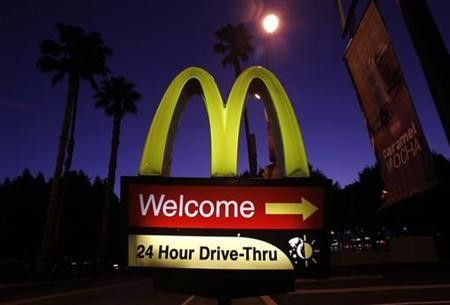Food Ads More Enticing To Obese Children: Study

New brain scan evidence suggests that obese children are much more susceptible to ads for food than children at a healthy weight.
For the study, researchers from the University of Missouri-Kansas City and the University of Kansas recruited 20 children between 10 and 14 years old. Half of the children were classified as obese based on their body-mass index, and half were at a clinically healthy BMI.
While they were hooked up to a functional magnetic resonance imaging, or fMRI, machine, the children were exposed to 60 images of food logos, such as the McDonald's arches, 60 nonfood logos like the Nike swoosh and 60 blurred images. Measures of their brain activity, based on blood flow, showed that the obese children's brains lit up more in certain areas associated with reward when they looked at the food logos.
In contrast, the healthy weight children showed more brain activity in areas of the brain associated with self-control when they viewed food logos than when they looked at nonfood logos. According to the paper, the different responses are not likely due to hunger pangs, since the children were asked to score how hungry they were before the experiment took place, and the reported levels of hunger were not significantly different between the two groups.
“These findings suggest that children carrying excess weight may be more responsive to food branding and thus at greater risk for marketing persuasion,” the authors wrote in the Journal of Pediatrics.
The scientists said their results are consistent with studies of adult brain responses to logos and with other studies involving food motivation and children -- the same regions that lit up in response to food logos were identified in previous studies that measured children's responses to actual images of food.
Plus, the latest study aligns with other work on child eating habits, brand name food products and self-control that takes place outside the MRI machine. One behavioral study published in the journal Appetite in 2009 found that, when obese children are allowed to eat unrestricted, they ate significantly more calories of brand-name food products compared with generic items. Healthy-weight children showed no such preference.
The current study also found that the obese study subjects' answers to questionnaires revealed that they had greater impulsivity as compared to the healthy-weight subjects.
Though the authors caution that their current study is somewhat small, their work adds to the growing body of evidence that treating childhood obesity may require a cognitive element.
“Including self-control training with obesity and behavioral health interventions may lead to greater success,” the authors wrote.
SOURCE: Bruce et al. “Brain Responses to Food Logos in Obese and Healthy Weight Children.” Journal of Pediatrics in press.
© Copyright IBTimes 2025. All rights reserved.





















